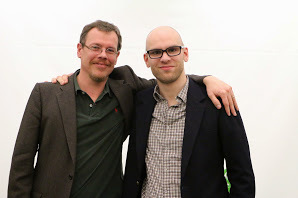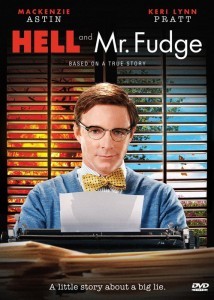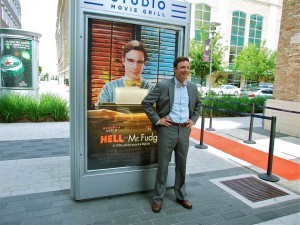Randal Rauser's Blog, page 167
November 4, 2015
Atheist as Neighbor Chapel Talk

Randal Rauser (that’s me!) with atheist Justin Schieber of the Real Atheology YouTube Channel (and formerly of the Reasonable Doubts Podcast).
I delivered this talk at Taylor Seminary’s chapel on October 29th, 2015 in recognition of Reformation Day (October 31st), a time when Protestant Christians recall, among other things, that the church is always in need of reformation.
My specific focus, based on my book Is the Atheist My Neighbor?, was to look at the inhospitable way that Christians have often treated atheists and others on the margins of belief, and to challenge the Christian community to extend a new hospitality to those with whom they disagree.
November 3, 2015
How to damn God with faint praise
Emcee: “And now, finally, I’d like to welcome our 2015 winner. Please give a very warm welcome to Dave Smith!”
[Applause]
Dave Smith: “Thanks very much. I’m honored to be here tonight. It wasn’t easy. And there’s a long list of people to thank.” [unfolds a piece of paper, takes a breath, and starts reading] “First, thanks to Mom and Dad for always being there. For my lovely wife Sue for all your support. And for my Thursday night poker pals. You guys know who you are!” [laughter] “Also I’d like to thank Al, Reggie, Jennifer, and Mike. Oh, and God, of course!”
[in heaven, God turns to Gabriel, incredulous] “Did he mention me after the ‘poker pals’?”
Gabriel: “Yup.”
November 2, 2015
Did Jesus know absolutely everything?
Don’t ever say I shy away from the hard questions. Here’s a slide from my upcoming lecture on fifth century Christology:

November 1, 2015
Want to lose friends and alienate people? Tell ’em about Jesus.
According to a new report, witnessing your Christian faith to people may do more harm than good. According to the study, when people were the object of Christian witnessing, 59% developed a more negative perception of Jesus and/or Christianity while only 19% developed a more positive perception. In other words, witnessing is three times as likely to produce negative results.
But didn’t we already know this? The “Jesus Talk” is famously awkward and off-putting, much like that guy who tries to steer the conversation toward his passion for Amway.
For a great illustration of this general fact, consider this great segment from Jim Gaffigan’s comedy act. Gaffigan is a Catholic, but he isn’t restricted to doing comedy for a Christian ghetto. Indeed, he’s one of the leading comics working today. And in this segment he points out that there is no quicker way to introduce awkwardness to a conversation (and a relationship) than pulling Jesus into it:
To be sure, the lesson here isn’t to never talk about your faith. But let other people ask you about it. The uninvited sales pitch can do a lot of damage.
Five Things You Could Have Done For Halloween
Today I decided to compile a list of five things you could have done yesterday instead of trick or treating. (Next year I’ll try to get ahead of the curve by offering some suggestions before Halloween.)
5. Watch the documentary Hell House which features one of the many fundamentalist/evangelical alternatives to the seasonal haunted house. The hell house is quite literally aimed at scaring you into heaven. Sadly, they often may do little more than scare people away from fundagelical churches. You can read my review of Hell House here.
4. Try a double feature: Listen to my podcast interview with Robin Parry talking about demons. And then follow it up with my podcast about the devil and backmasked music. Brr, you’ll be up for hours!
3. Challenge the stereotype that evangelicals aren’t cool by sponsoring a neighborhood Hallelujah Party complete with Smores, apple bobbing, Mr. Bean videos, and a rousing game of Chubby Bunny. Show the world that Christian conservatives can have fun too!
2. Celebrate Reformation Day by dressing up as Martin Luther and going around to your neighborhood hammering reasonable facsimiles of Luther’s 95 Theses onto your neighbors’ doors … at least until the cops arrive.
1. Watch the documentary Room 237 which invites conspiratorial superfans of Kubrick’s The Shining to share their slightly insane — and sometimes disturbingly brilliant — interpretations of the film. (Just don’t show Room 237 at the Hallelujah Party.)
October 30, 2015
My Best Halloween Memory Ever. What’s Yours?
 When I was growing up my parents owned many vehicles: three Audi 5000s, a Nissan Maxima, a Jeep Wagoneer, a Datsun 210, a Ford Ranger, a Honda Prelude, and so on. Of all those vehicles, there is one I dearly wish I still had in my own driveway: my dad’s 1969 GMC truck with a roaring 327.
When I was growing up my parents owned many vehicles: three Audi 5000s, a Nissan Maxima, a Jeep Wagoneer, a Datsun 210, a Ford Ranger, a Honda Prelude, and so on. Of all those vehicles, there is one I dearly wish I still had in my own driveway: my dad’s 1969 GMC truck with a roaring 327.
Sadly, I don’t have any pictures of that beloved pickup, but it looks very similar to the truck pictured here (except that my dad’s had a black roof and a more visible side exhaust that rattled windows for three blocks).
 This brings me to my favorite Halloween memory. I grew up in a hilly neighborhood overlooking Okanagan Lake in Kelowna, BC. Our house had a view similar to this picture.
This brings me to my favorite Halloween memory. I grew up in a hilly neighborhood overlooking Okanagan Lake in Kelowna, BC. Our house had a view similar to this picture.
Most of the time, I enjoyed our neighborhood: vineyards, ponderosa pines, and a view of the lake and mountains. But there was a definite downside when it came to Halloween. In our neighborhood we really had to work for our candy: walking up steep hills and negotiating long driveways, all for a couple miniature Snickers or a homemade popcorn ball.
Enter my dad and the 1969 GMC truck. One Halloween my dad chauffeured me and three friends sitting on the open tailgate as we slowly cruised around our neighborhood. As other kids labored to climb steep hills, we slowly rolled up the road like a seasonal parade float, laughing, joking, and swapping candy to the melodic low burble of an American V8.
Thanks Dad!
So yeah, that’s my best Halloween memory ever.
What’s yours?
October 29, 2015
Hell and Mr. Fudge: A Review
 Twenty years ago I took a course in apologetics at Trinity Western University. The main assignment was a debate in front of the class at the end of the semester. My friend and I were given the task of defending annihilationism — the view that hell constitutes the final destruction of the unregenerate — over-against the traditional view of eternal conscious torment.
Twenty years ago I took a course in apologetics at Trinity Western University. The main assignment was a debate in front of the class at the end of the semester. My friend and I were given the task of defending annihilationism — the view that hell constitutes the final destruction of the unregenerate — over-against the traditional view of eternal conscious torment.
While I started off my research as a mere academic exercise, by the time I mounted the podium to present my case, I had become a convinced annihilationist.
The most important single book in my shift of position was written by a theologian named Edward Fudge. The Fire That Consumes, published in 1982, provided a powerful summary of biblical, historical, and philosophical sources, and helped shift my thinking as a young undergraduate in favor of annihilationism. (A couple years later I solidified my position when I wrote a graduate paper on hell for theologian Stanley Grenz titled “Who in Hell Lives Forever?”)
So I was surprised and intrigued a couple years ago when I first learned of the 2012 film Hell and Mr. Fudge which depicts the backstory of Edward Fudge and his adoption of annihilationism. The story begins with the untimely death of 13 year old Edward’s rebellious friend in the early 1950s, a tragedy that raises the haunting spectre of a troubled youth spending eternity suffering in the Lake of Fire. It continues on through his time at Bible college in the early 1960s as he learned to ask hard questions and pursue the truth whatever the cost. And it continues on as he began life as a struggling pastor, one who would lose his job by forcing the issue of racial integration. All the while, Fudge continued his dauntless pursuit to understand hell as an independent researcher.

Mackenzie Astin posing with a “Hell and Mr. Fudge” movie poster
Hell and Mr. Fudge has the modest production values of your typical “Christian movie”. For example, while Edward Fudge is played capably by Mackenzie Astin, there was clearly no money in the budget for makeup: to be blunt, a 39 year old Astin looks a bit absurd playing an 18 year old freshman at Bible college.
The movie is “Christian” in other ways as well. For example, the screenplay is rather bland and forgettable. But even so, I was never bored while watching Hell and Mr. Fudge. Indeed, given my own experiences chafing against the sometimes constraining and reactionary wings of conservative Protestantism, I could certainly sympathize with Edward Fudge as he wrestled with the doctrine of eternal conscious torment and those who would seek to quash his inquiry.
Along the way, the narrative does a decent job of informing the average viewer of Fudge’s reasoning from scripture and tradition, as well as his pivotal revelation where he realizes that the eternality of the soul is a foreign import to Judeo-Christian anthropology by way of Platonic philosophy. (To be sure, that hardly settles the issue: after all, just because something is Greek in origin hardly entails that it is thereby wrong.)
The film ends with Fudge addressing a crowd in the wake of the publication of The Fire that Consumes, a book that the film rather grandiosely describes as one of the most influential tomes on hell ever written. (As important as the book may be in the discussion over the last thirty years, that accolade still seems a bit of a stretch.)
Hell and Mr. Fudge helps itself to other indulgences to spur the tale including the impression that annihilationism was unknown from the time of the New Testament until Edward Fudge. That is nothing more than the screenwriter’s conceit, as is the grossly uncharitable dismissal of the majority tradition of eternal conscious torment as nothing more than “a lie”.
But the real takeaway lesson here is not simply about the nature of hell, however important a topic that may be. Rather, it is about the nature of truth and our freedom to pursue what we understand that truth to be over-against the reactionary forces of tradition, conservatism, and fear.
The challenge is captured memorably in one exchange between Edward and an elderly pastor whose counsel he seeks immediately prior to going on the radio to share his new-found convictions about the temporary nature of the punishments of hell. The pastor doesn’t discourage Edward from pursuing and proclaiming the truth as he sees it, but he does warn Edward that the forces of conservative tradition may see things differently:
“Folks are partial to the truth that they’ve already got. If you come marching up with some brand new 200 watt light, folks gonna say, ‘whoa, wait a minute. Too much light. I prefer that itty bitty light at the back of the refrigerator.'”
That’s sage advice. Many folks do indeed remain partial to the “truth” they’ve already got. “Hell is forever!” they say. “That’s just the way it is. Some things will never change.”
But, if I may be permitted an indulgence of my own, don’t you believe it.
October 28, 2015
Those who ignore the causes of Palestinian violence…
This morning the following tweet appeared on my Twitter feed (as retweeted by Michael Brown):

First, let me begin by noting that while ISIS apparently posted the pictures, I take it the focus of Cantor’s comments is not so much ISIS as the Palestinians since (1) the Palestinians are on the frontline of this abhorrent incitement of violence against Jews and (2) Palestinians constitute a cultural group while ISIS does not (and Cantor refers to the culture in his tweet). As a result, my response is concerned with the Palestinians, not with ISIS.
That said, we can turn to the tweet itself beginning with Ron Cantor’s rhetorical question. The answer: No, that isn’t normal behavior (obviously).
So now the next question: when large numbers of people in a society begin to act in such an abnormal manner, how do we explain that abnormal behavior?
Ron Cantor immediately provides his answer: the people group in question are “A blood-loving culture.” In other words, the people simply love and glorify violence.
I have three responses to that analysis.
First, while I concede that it is always possible that an entire cultural group is on the whole simply behaving in an inexplicably degenerate way with no prior contributing causes or catalysts, the better part of charity and wisdom is first to seek for potential causes and catalysts which could provide some kind of explanation for the abnormal behavior. And let me add what should be obvious (but is nonetheless regularly missed in conversations like this): a causal factor is not the same as a justification.
Second, anybody with a passing familiarity with the tortured context of Israel and the occupied territories over the last fifty years will be aware of ample causes and catalysts for this current morally indefensible incitement to random violence. If you want to spend a couple hours getting up to speed on some of that background, you would do well to watch the 2012 documentary “The Gatekeepers” which interviews six former heads of Shin Bet, Israel’s secret service agency.
Third, when group 1 is being attacked by group 2 who is acting in an “abnormal” way, about the worst service you can do to group 1 is to short-circuit the search for underlying causes and catalysts with facile explanations that demonize the abnormally behaving group 2 … like dismissing them as “a blood-loving culture.” The wise person will exhaust the search for causes and catalysts which might be addressed in breaking the spiral into abnormality before they simply dismiss the entire group as fundamentally irrational and/or immoral.
George Santayana famously observed, “Those who cannot remember the past are condemned to repeat it.” One might add, those who ignore the underlying causal factors of abnormal behavior are effectively encouraging that very behavior … as well as the future victimization of others by it.
October 27, 2015
What Joe Biden can teach us
These days folks don’t merely “agree to disagree”. They go out of their way to call into question the very motives of those on the other side of the ideological aisle. The Rebellion Thesis that dismisses all instances of atheism as sinful rebellion against the plain and clear witness of creation is yet one more example of this lamentable tendency to marginalize one’s opponents.
In his article “The Long Goodbye,” John Dickerson describes how Vice President Joe Biden, then a young politician in Washington, came to set aside this tendency to criticize people rather than the views they hold:
“[Joe] Biden often tells the story of his early days in the Senate when the Democratic Majority Leader Mike Mansfield chided him for making a comment about North Carolina Republican Sen. Jesse Helms’ heartlessness when it came to the disabled. When Mansfield told Biden that Helms and his wife had adopted a disabled boy, he also gave the young senator some advice that he repeated again and again: “Joe, never question another man’s motive. Question his judgment but never his motive.”
October 26, 2015
Offensively trite suburban reasons to believe in God # 257: New earbuds just when you need them
Yesterday I was out for a run when one of my earbuds stopped working suddenly. Completing the run with the loss of stereo sound was bad enough, but even worse, I had no backup earbuds.
What was I supposed to listen to now? Running with one working earbud was simply not an option. And the prospect of having to give up a soundtrack of The Byrds and Traffic for the birds and traffic was deeply unsettling.
As I was lost in this melancholy gloom, my wife returned from buying groceries. And there it was wedged in the bag between milk and bread: incredibly, she had picked up for me a set of $20 earbuds on sale for 5 bucks.
Mere good luck? Or the benevolent care of a creator who wants to ensure the stereo soundtrack of his faithful child remains uninterrupted?
I know where I’m placing my bets.




